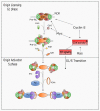Detours to Replication: Functions of Specialized DNA Polymerases during Oncogene-induced Replication Stress
- PMID: 30347795
- PMCID: PMC6214091
- DOI: 10.3390/ijms19103255
Detours to Replication: Functions of Specialized DNA Polymerases during Oncogene-induced Replication Stress
Abstract
Incomplete and low-fidelity genome duplication contribute to genomic instability and cancer development. Difficult-to-Replicate Sequences, or DiToRS, are natural impediments in the genome that require specialized DNA polymerases and repair pathways to complete and maintain faithful DNA synthesis. DiToRS include non B-DNA secondary structures formed by repetitive sequences, for example within chromosomal fragile sites and telomeres, which inhibit DNA replication under endogenous stress conditions. Oncogene activation alters DNA replication dynamics and creates oncogenic replication stress, resulting in persistent activation of the DNA damage and replication stress responses, cell cycle arrest, and cell death. The response to oncogenic replication stress is highly complex and must be tightly regulated to prevent mutations and tumorigenesis. In this review, we summarize types of known DiToRS and the experimental evidence supporting replication inhibition, with a focus on the specialized DNA polymerases utilized to cope with these obstacles. In addition, we discuss different causes of oncogenic replication stress and its impact on DiToRS stability. We highlight recent findings regarding the regulation of DNA polymerases during oncogenic replication stress and the implications for cancer development.
Keywords: Difficult-to-Replicate Sequences; Microsatellites; Polymerase eta; Polymerase kappa; common fragile sites; genome instability; non-B DNA; replication stress.
Conflict of interest statement
The authors declare no conflict of interest.
Figures



Similar articles
-
Role of specialized DNA polymerases in the limitation of replicative stress and DNA damage transmission.Mutat Res. 2018 Mar;808:62-73. doi: 10.1016/j.mrfmmm.2017.08.002. Epub 2017 Aug 14. Mutat Res. 2018. PMID: 28843435 Review.
-
Overexpression of oncogenic H-Ras in hTERT-immortalized and SV40-transformed human cells targets replicative and specialized DNA polymerases for depletion.PLoS One. 2021 May 7;16(5):e0251188. doi: 10.1371/journal.pone.0251188. eCollection 2021. PLoS One. 2021. PMID: 33961649 Free PMC article.
-
Adaptive use of error-prone DNA polymerases provides flexibility in genome replication during tumorigenesis.Cancer Sci. 2024 Jul;115(7):2125-2137. doi: 10.1111/cas.16188. Epub 2024 Apr 23. Cancer Sci. 2024. PMID: 38651239 Free PMC article. Review.
-
Both high-fidelity replicative and low-fidelity Y-family polymerases are involved in DNA rereplication.Mol Cell Biol. 2015 Feb;35(4):699-715. doi: 10.1128/MCB.01153-14. Epub 2014 Dec 8. Mol Cell Biol. 2015. PMID: 25487575 Free PMC article.
-
Maintenance of Genome Integrity: How Mammalian Cells Orchestrate Genome Duplication by Coordinating Replicative and Specialized DNA Polymerases.Genes (Basel). 2017 Jan 6;8(1):19. doi: 10.3390/genes8010019. Genes (Basel). 2017. PMID: 28067843 Free PMC article. Review.
Cited by
-
Replication Stress, Genomic Instability, and Replication Timing: A Complex Relationship.Int J Mol Sci. 2021 Apr 30;22(9):4764. doi: 10.3390/ijms22094764. Int J Mol Sci. 2021. PMID: 33946274 Free PMC article. Review.
-
DEK oncoprotein participates in heterochromatin replication via SUMO-dependent nuclear bodies.J Cell Sci. 2023 Dec 1;136(23):jcs261329. doi: 10.1242/jcs.261329. Epub 2023 Dec 15. J Cell Sci. 2023. PMID: 37997922 Free PMC article.
-
Nontraditional Roles of DNA Polymerase Eta Support Genome Duplication and Stability.Genes (Basel). 2023 Jan 9;14(1):175. doi: 10.3390/genes14010175. Genes (Basel). 2023. PMID: 36672916 Free PMC article. Review.
-
The DHX9 helicase interacts with human DNA polymerase δ4 and stimulates its activity in D-loop extension synthesis.DNA Repair (Amst). 2023 Aug;128:103513. doi: 10.1016/j.dnarep.2023.103513. Epub 2023 May 13. DNA Repair (Amst). 2023. PMID: 37285751 Free PMC article.
-
Distinct signaling signatures drive compensatory proliferation via S-phase acceleration.PLoS Genet. 2022 Dec 15;18(12):e1010516. doi: 10.1371/journal.pgen.1010516. eCollection 2022 Dec. PLoS Genet. 2022. PMID: 36520882 Free PMC article.
References
-
- Tsantoulis P.K., Kotsinas A., Sfikakis P.P., Evangelou K., Sideridou M., Levy B., Mo L., Kittas C., Wu X.R., Papavassiliou A.G., et al. Oncogene-induced replication stress preferentially targets common fragile sites in preneoplastic lesions. A genome-wide study. Oncogene. 2008;27:3256–3264. doi: 10.1038/sj.onc.1210989. - DOI - PubMed
Publication types
MeSH terms
Substances
LinkOut - more resources
Full Text Sources

